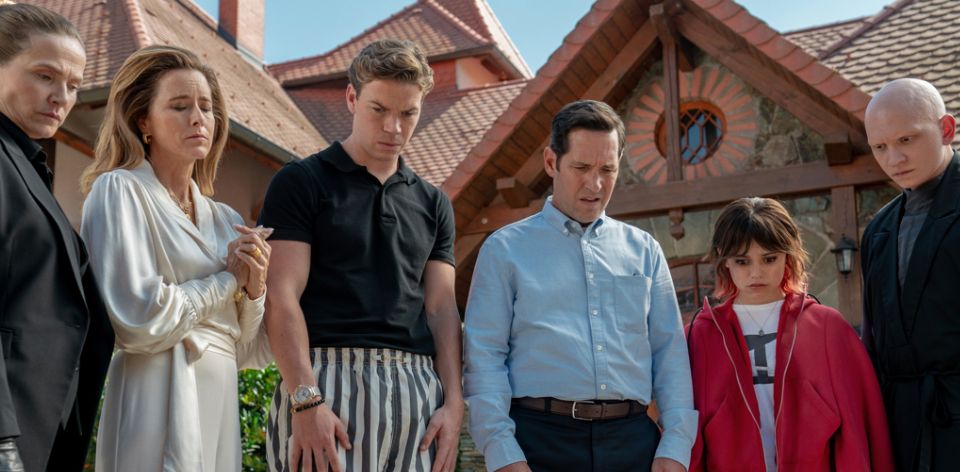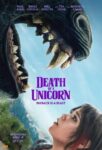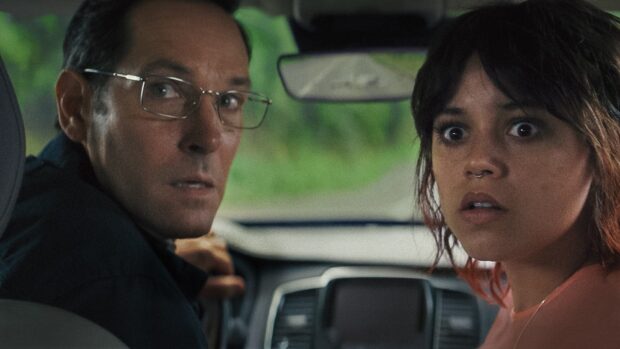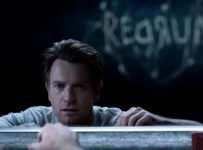Unicorns are real—or at least, they exist in the cultural imagination. Over centuries, we’ve imbued them with meaning, transforming them from mythical beasts into symbols of purity, power, and rebellion. Whether lurking in the shadows of Legend, shimmering in the neon haze of Blade Runner, or standing as an emblem of LGBTQIA+ pride, they are everywhere. In Alex Scharfman’s film, however, their presence takes on a different weight—one that leans fully into broad satire.
Given their cultural significance, killing a unicorn sends a powerful message. That’s exactly where DEATH OF A UNICORN (the clue’s in the title) begins. As Elliot (Paul Rudd) and his daughter Ridley (Jenna Ortega) drive deep into the wooded mountains on their way to the estate of Elliot’s boss, the terminally ill pharma oligarch Odell (Richard E. Grant), they strike a young unicorn.
What was meant to be a weekend of corporate ladder-climbing quickly turns into something far stranger. When the unicorn’s horn and blood are revealed to have potent properties, a ruthless scramble ensues to dissect and commercialise the carcass. Yet Ridley finds herself drawn to the creatures, and it soon becomes clear the foal was not alone—and its parents are not happy.
Scharfman’s script takes broad swipes at the class divide, establishing a stark dichotomy between the haves and have-nots almost immediately. The long-suffering butler, Griff (played with wonderfully taciturn aplomb by Anthony Carrigan), serves as a reminder of the “silent majority” of working-class labour that the Leopold family and their ilk carelessly exploit. Meanwhile, Elliot’s apparent early heel turn—willingly going along with Odell’s scheme in the hopes of securing some scraps—only reinforces the film’s cynical outlook.
Yet Scharfman never really pushes beyond surface-level commentary, whether on class or the environment. Once the unicorn parents arrive—nightmarish steeds ripped from the darkest corners of mythology—the film shifts gears into full-blown horror. Aside from a few mystical visions hinting at a cosmic connection binding all living things, it largely devolves into spam-in-a-cabin survival mode, all frantic running and gut-spilling gore.
Still, at the heart of the film is the father-daughter relationship between Rudd and Ortega, emotionally estranged following the death of Ridley’s mother. Rudd uncharacteristically downplays some of his natural comedic tendencies as a misguided parent, while Ortega explores a different kind of angsty teen than her Wednesday persona. It’s a fine contrast to the indifferent relationship between Téa Leoni’s matriarch and the singular comedic entitlement of her son, played to perfection by Will Poulter. (Sidebar: how great is it to see Leoni’s comedy chops back on the big screen?)
DEATH OF A UNICORN may not be the biting swing at the rich we desperately need in 2025, but we can still delight in its chaos. Like these creatures of myth, movies have the power to hold up a mirror to our society—and maybe even show us a lighter way. The biggest takeaway? If you do run over a majestic creature with your car, don’t be a jerk about it. Until then, we’ll keep searching for that unicorn.
2025 | USA | DIRECTOR: Alex Scharfman | WRITERS: Alex Scharfman | CAST: Paul Rudd, Jenna Ortega, Will Poulter, Téa Leoni, Richard E. Grant, Anthony Carrigan, Jessica Hynes | DISTRIBUTOR: A24 (USA), VVS Films (Australia/NZ) | RUNNING TIME: 107 minutes | RELEASE DATE: 10 April 2025 (Australia), 28 March 2025 (USA)






